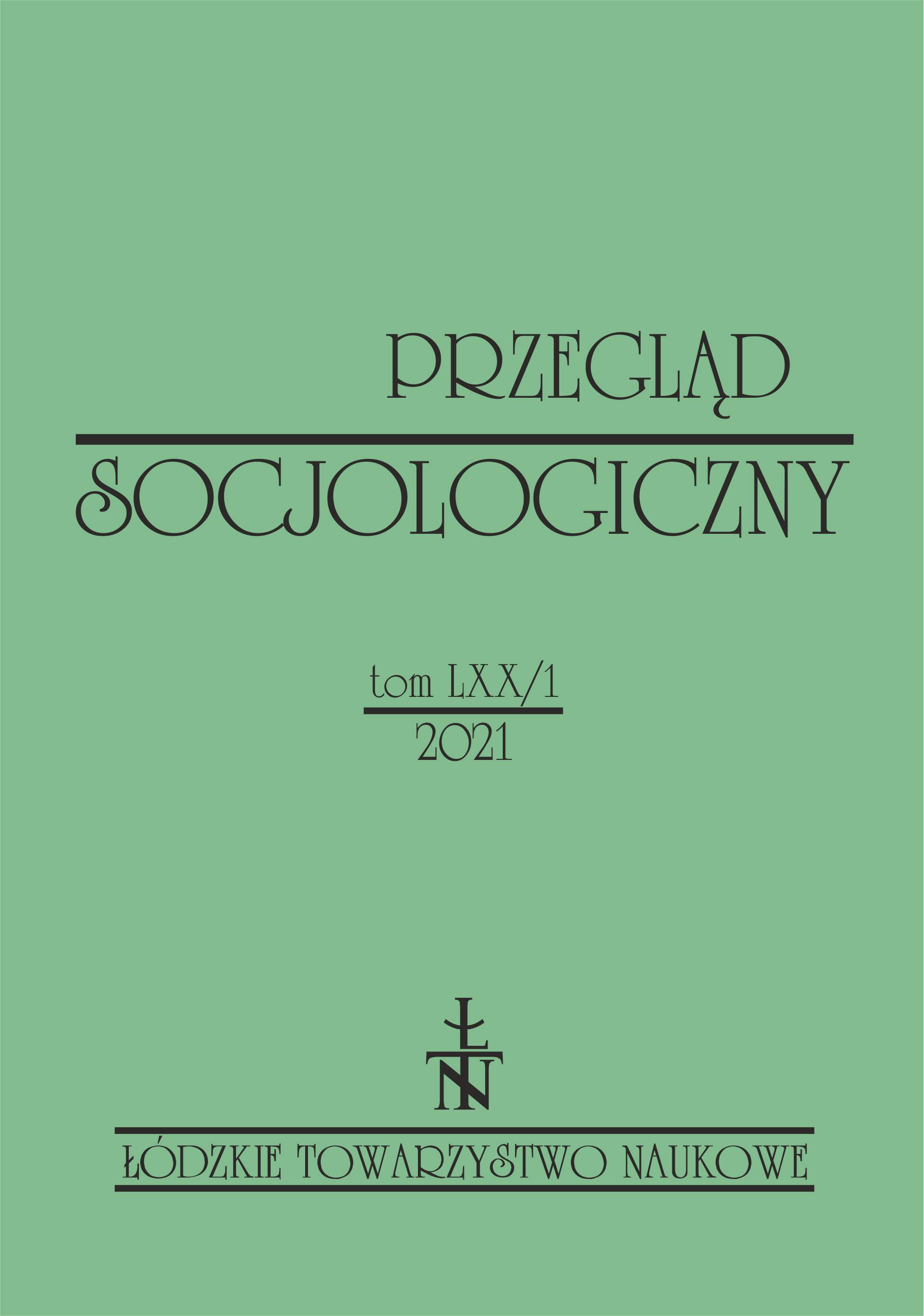Recursive Institutionalization Model in the Analysis of the Cashlessness Phenomenon – Possibilities of Application
DOI:
https://doi.org/10.26485/PS/2021/70.1/4Keywords:
institutionalization, social script, cashlessness, mixed-methodAbstract
The article addresses the problem of the methodological challenges that researchers face when their goal is to capture the process of the institutionalization of an economic phenomenon in a dynamically changing environment. Referring to the outcomes of empirical research on the attitudes of small and medium-sized enterprises in Poland to cashless payments, the article discusses the methodological complexity of analysing of the institutionalization the social script, according to which many social actors from different organizational fields operate. The article is part of the neo-institutional program of research on institutions in the economic sphere. It presents the concept of using the recursive institutionalization model by Barley and Tolbert [1997] to study the process of shaping the phenomenon of cashlessness in the economy.
References
Alvesson Mats, André Spicer. 2019. “Neo-institutional theory and organization studies: A midlife crisis?”. Organization Studies 40(2): 199–218.
Arvidsson Niklas. 2019. The future of cash in Sweden. In: Building a cashless society. Springer briefs in economics, N. Arvidsson, 75–84. Cham: Springer. https://doi.org/10.1007/978-3-030-10689-8_8.
Barley Stephen R., Pamela S. Tolbert. 1997. “Institutionalization and structuration: Studying the links between action and institution”. Organization Studies 18(1): 93–117.
Bátiz-Lazo Bernardo, Thomas Haigh, David L. Stearns. 2014. “How the future shaped the past: The case of the cashless society”. Enterprise & Society 15(1): 103–131.
Berger Peter, Thomas Luckmann. 2016. The social construction of reality. In: Social theory re-wired: New connections to classical and contemporary perspectives. Second edition, W. Longhofer, D. Winchester (eds.), 116–122. London: Routledge.
Creswell John W. 2009. Research design. Qualitative, quantitative and mixed-methods approaches. London: Sage Publications
Czarniawska Barbara. 2009. “Emerging institutions: Pyramids or anthills?”. Organization Studies 30(4): 423–441.
DiMaggio Paul. 1988. Interest and agency in institutional theory. In: Institutional patterns and organizations: Culture and environment, L. Zucker (ed.), 3–21. Cambridge, Massachusetts: Ballinger Publishing.
DiMaggio Paul, Walter Powell. 1983. “The iron cage revisited: Institutional isomorphism and collective rationality in organizational fields”. American Sociological Review 48(2): 147–160.
Granovetter Mark. 2017. Society and economy: Framework and principles. Massachusetts: Harvard University Press.
Hall Peter A., Rosemary C.R. Taylor. 1996. “Political science and the three new institutionalisms”. Political Studies XLIV: 936–957.
Ingram Paul, Karen Clay. 2000. “The choice-within-constraints new institutionalism and implications for sociology”. Annual Review of Sociology 26: 525–546.
Jepperson Ronald L. 1991. “Institutions, institutional effects, and institutionalism”. In: The new institutionalism in organizational analysis, W.W. Powell, P.J. DiMaggio (eds.), 143–163. Chicago: The University of Chicago Press.
Jose Anita, Mary S. Thibodeaux. 1999. “Institutionalization of ethics: The perspective of managers”. Journal of Business Ethics 22(2): 133–143.
Mair Johanna, Georg Reischauer. 2017. “Capturing the dynamics of the sharing economy: Institutional research on the plural forms and practices of sharing economy organizations”. Technological Forecasting and Social Change 125: 11–20.
Narodowy Bank Polski. 2020. Informacja o kartach płatniczych I kwartał 2020 r. Warszawa.
Nee Victor. 1998. Sources of the new institutionalism. In: The new institutionalism in sociology, M.C. Brinton i V. Nee (eds.), 1–16. New York: Russel Sage Foundation.
North Douglass C. (1991). “Institutions”. Journal of Economic Perspectives 5(1): 97–112.
Ostrom Elinor. 1990. Governing the commons. The evolution of institutions for collective action. New York: Cambridge University Press.
Ostrom, Elinor. 2011. “Background on the institutional analysis and development framework”. Policy Studies Journal 39(1): 7–27.
Onwuegbuzie Anthony. J., Charles Teddlie. 2003. “A framework for analyzing data in mixed methods research”. In: Handbook of mixed methods in social and behavioral research, A. Tashakkori, C. Teddlie (eds.), 351–383. Thousand Oaks, CA: Sage Publications.
Pawlak Mikołaj, Łukasz Srokowski. 2014. „Instytucje i organizacje: Przekraczanie paradygmatów w badaniach nad organizacjami”. W: Pomiędzy i wewnątrz: Instytucje, organizacje i ich działania, M. Pawlak i Ł. Srokowski (red.), 7–31. Warszawa: IPSiR UW.
Polasik Michał. 2015. „Stan i potencjał rozwoju sieci akceptacji kart płatniczych w Polsce”. Acta Universitatis Nicolai Copernici. Ekonomia XLVI(1): 23–58.
Sadowski Ireneusz. 2014. „Współczesne spojrzenie na instytucje: Ewolucja pojęć, problem modelu aktora i poziomy analizy instytucjonalnej”. Przegląd Socjologiczny LXIII(3): 89–114.
Scott Richard. 1995. Institutions and organizations: Ideas, interests, and identities. Los Angeles, CA: Sage Publications.
Sillince John A.A., James R. Barker. 2012. “A tropological theory of institutionalization”. Organization Studies 33(1): 7–38.
Symon, Gillian, Anna Buehring, Phil Johnson, Catherine Cassell. 2008. “Positioning qualitative research as resistance to the institutionalization of the academic labour process”. Organization Studies 29(10): 1315–1336.
Szalacha-Jarmużek Joanna, Michał Polasik, Marta Jakubowska. 2020 [w druku]. The institutionalization of “cashless Poland”: Values, norms, sanctions and grand narrations in the SMEs’ perspective on the adoption of cashless payments.
Sztompka Piotr. 2004. Socjologia. Kraków: Znak.
Tashakkori Abbas, Charles Teddlie. 2010. “Overview of contemporary issues in mixed methods research”. In: Sage handbook of mixed methods in social & behavioral research, A. Tashakkori, C. Teddlie (eds.), 1–41. Los Angeles, CA: Sage Publications.



